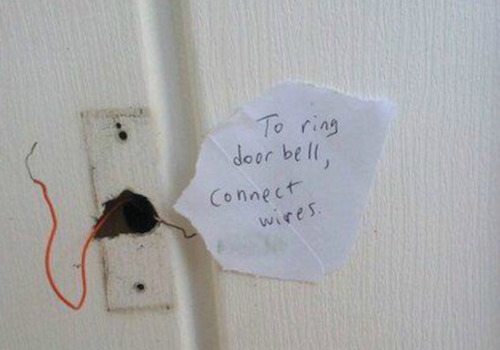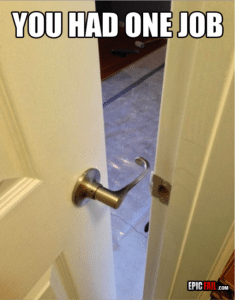It’s one of the most common questions we get from potential Sellers…what should I do to increase the value of my house before I put it up for sale?
Here’s our advice on what to focus on when preparing your house for sale:
 Focus on the “Big Objections”
Focus on the “Big Objections”
I know that green Formica countertop in the kitchen has been driving you nuts for years, but unless it’ll be an objection by the majority of Buyers, you’re best leaving personal renovations to the new owner.
Focus on the things that will likely be objections for most of the Buyers. For example: buried oil tanks; asbestos; scary exposed electrical wiring. Don’t focus on the things you’ve always wanted to change but didn’t get around to.
Make Sure All The “Big Stuff” Works
If the target for your home is a first-time buyer, they’ll worry a LOT about the big stuff and will assume it’ll cost more to fix than it actually will.
Unless you’re selling your home to a Buyer who is likely to gut it or raze it, you’ll want to make sure that the following are in good working condition:
- Furnace and the air conditioning – I’m not saying your furnace and A/C need to be new and high-efficiency, but they should be working. Depending on your price, target Buyer and what’s happening in the market, it might be worth upgrading the mechanicals if they are at the end of their lives. But in general, you won’t see 100% ROI on replacing these unless they will be a Big Objection for most of the Buyers.
- Roofing – Nobody likes to spend money on a new roof, and it’ll only be worth investing in replacing it if it’s truly an eyesore and past the end of its life. And in many cases, if the market is strong and demand in your area is high, it might be a better option to just factor in the cost of a new roof in your asking price and pass on that job to the new Buyer. At a minimum: make sure that any leaks are fixed.
- Appliances (unless the whole kitchen needs to be gutted, in which case you might as well let the new owners pick their own appliances). If you’ve got old appliances in an otherwise renovated kitchen, they may be worth replacing. If they’re in the way of people being awed by a kitchen that would otherwise have been a key selling point, consider replacing them (Your real estate agent can guide you in this decision).
- Lighting and electrical – If you still have knob and tube wiring in your house, it’ll probably make more sense to get a couple of quotes to get it replaced and provide those quotes to potential Buyers vs. replacing it yourself. Replacing wiring involves opening up walls and ceilings and a new Buyer might very well want to do some other renovations at the same time. But…of course, you’ll need to factor that a Buyer will need to replace the wiring into your asking price. [Related: All About Knob and Tube Wiring]
- Plumbing – It’s usually fairly cheap and easy to get leaky faucets and plugged toilets fixed, and it’ll make a big difference to the Buyer’s perception about how well the home has been cared for. If you’ve got bigger plumbing jobs (e.g., replacing lead or copper pipes), it’s probably not worth doing before the sale.
Pro Tip: Consider getting a home inspection done on your home to help guide where you should spend $$ (or at the very least, be able to factor that into the price and be aware of any big issues during negotiations) [Related: Should You Get a Pre-Listing Home Inspection?]
 Easy Fixes and Lipstick
Easy Fixes and Lipstick
There are some things you can do that quick and fairly expensive and can increase the sale price of your home.
- Curb appeal matters and many Buyers will decide how they feel about your house in the first few minutes. Consider repainting the door and repairing a cracked porch.
- The backyard is one of the places many Toronto Buyers fall in love, so don’t overlook it. Mow the lawn, weed the gardens, invest in some colorful flowers and spruce up the patio furniture with some new cushions. Replace any crumbling stones, consider re-staining the deck and clean out the garage.
- A fresh paint job is probably one of the cheapest fixes you can make, and you’ll almost always see a return. Paint in neutral colors and hire a professional (Buyers easily see through a quick and dirty paint job, and you don’t want them thinking they have to paint it again). At a minimum: remove the scuff marks on the walls (hello, Magic Eraser) and touch up any damaged walls.
- New grout in the bathtub and shower. This is a super easy fix and prevents Buyers from thinking your bathroom is old or unkempt. If you aren’t up to doing it yourself, it’s a quick job for your local handyman.
- Shine the floors. If you’ve got hardwood floors, polishing or refinishing might be worth doing. At a minimum, fill the cracks and conceal the scratches as best you can.
- Wash the windows. Clean windows will make your house seem brighter, and who doesn’t want that?
- Lighting. Upgrading your lighting (both permanent fixtures and occasional lighting) makes a huge difference to a room! At a minimum, replace any burned bulbs and ensure that you’ve got the maximum allowable wattage in your fixtures. Keep in mind, that light fixtures are often included with the sale, so don’t go blowing $2,000 on a chandelier. Buy stylish fixtures that fit the look and feel of your house.
 Don’t Over-Renovate
Don’t Over-Renovate
Truth: Most Buyers either want to renovate themselves or want a fully renovated house.
Unless you’re a contractor and doing most of the work yourself, big renovations in preparation for a sale can be risky, and you’ll rarely see a return on investment. Renovation projects always get bigger and more expensive and tend to lead to other renovation projects. It’s usually best to leave that to the new Buyer. If you decide to renovate before selling: bring in the professionals vs. DIY.
Pro Tip: Call your agent before you start any big repairs or renovations. Don’t worry, we’ve seen it all…your home doesn’t need to be in perfect condition when we come over.
Still reading? Click here to read our 30-Day Guide to Getting Your House Ready for Sale or get in touch!
